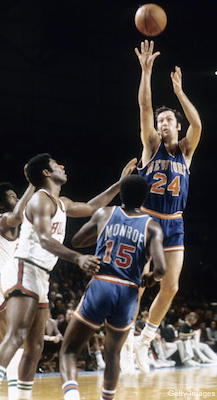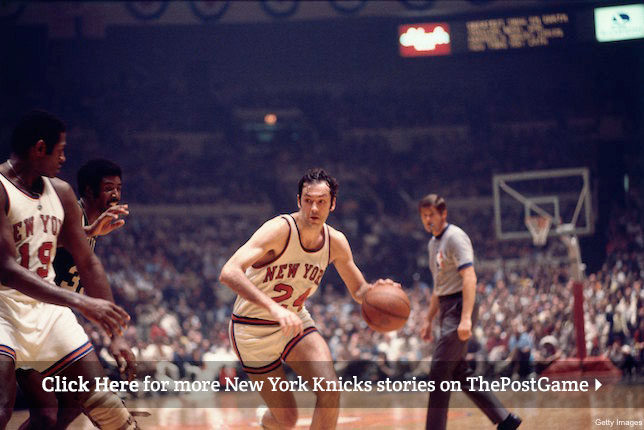Bill Bradley -- Hall of Famer, Rhodes Scholar, NBA champion, Olympic gold medalist and U.S. senator -- was a ball deflater.
To put the New England Patriots' DeflateGate flap in some perspective, consider that one of the most respected sportsman and statesman in U.S. history was known for fiddling with the ball pressure before and sometimes even during a game.
This nugget of information was part of a 1987 radio documentary produced on the WNBC SportsNight program by Budd Mishkin and Gary Bridges about the glory days of the Knicks. It featured an incredible range of interviews including media who covered the team on a daily basis. Here's what three of them had to say about Bradley's obsession with how the basketball was inflated.

Leonard Lewin, New York Post
"Just before every game, they'd give him the game ball, and people used to wonder why. Why would he? He was testing the weight. He was the ball tester. The official ball tester for the Knicks. He'd just squeeze the ball, and he'd know how much pounds of weight was in."
Phil Berger, New York Times, author of "Miracle On 33rd Street: The New York Knickerbockers' Championship Season, 1969-1970"
"He liked a dead ball. That is a kind of ball that would hit the rim and die. He hated the rebounder's ball. Rebounders love a ball that comes flying off because it's way up in the air, and who gets the ball but the guy that can soar for it. Basketball can be all kinds of consistencies within a certain prescribed range, so he would go through the balls and pick out the one that was his ball.
"I remember one playoff game against the Bullets, somebody sneaked in a rebounder's ball, and he went crazy. Screaming at the refs. When he'd scream, the veins in his neck would start popping out. He'd get red in his forehead and face. He was very disturbed that they had sneaked in a live, rabbity ball. He hollered loud enough and long enough, so they brought back that dead ball that he liked."
Marv Albert, Knicks radio play-by-play announcer
"One referee once told me -- and it was during a Knick-Bullet playoff series -- Bradley wasn't satisfied with the way the basketball felt. He felt there was too much air in it, and he complained about it, and they didn't take heed. And then in the second half, he was spotted with one of those little devices that you take air out of the ball and pump air in, and he tried to sneak it out. He tried to let air out of the basketball, so no one would see. This is our U.S. Senator Bill Bradley."
The recent ESPN "30 for 30" film on the Knicks' championship era of the late 60s and early 70s, When The Garden Was Eden, was a terrific documentary. But the WNBC radio production, called "Those Championship Seasons," was more comprehensive with fun and intriguing anecdotes like this one about Bradley.
-- Update: A tweet from sports graphic designer Todd Radom on Wednesday provided additional documentation. Radom posted a clipping of an old Chicago Tribune article in which Jackson discussed how the Knicks used to take air out of the ball.
Phil Jackson, quoted in 1986, saying that championship New York Knicks teams intentionally deflated basketballs: pic.twitter.com/wJqAnC6fRQ
— Todd Radom (@ToddRadom) January 28, 2015
Jackson responded with a tweet of his own to clarify that although the Knicks preferred a ball with less air and less bounce, they stayed within the legal limit when deflating.
joy of tweet is correcting errors. Knicks used under inflated balls. wrong! ball has7-9lbs psi. we wanted 7 psi softer but not illegal.
— Phil Jackson (@PhilJackson11) January 28, 2015
In case the type in the Tribune clipping is too small for you to read, here are Jackson's quotes from it:
"What we used to do was deflate the ball. We were a short team with our big guys like Willis (Reed), our center, only about 6-8 and Jerry Lucas also 6-8. DeBusschere, 6-6. So what we had to rely on was boxing out and hoping the rebound didn't go long."
"To help ensure that, we'd try to take some air out of the ball. You see, on the ball it says something like 'inflate to 7 to 9 pounds.' We’d all carry pins and take the air out to deaden the ball."
"It also helped our offense because we were a team that liked to pass the ball without dribbling it, so it didn't matter how much air was in the ball. It also kept other teams from running on us because when they'd dribble the ball, it wouldn't come up so fast."






